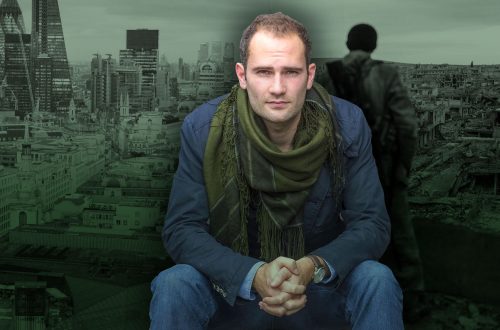The Atlantic has a very interesting, and increasingly familiar story of a jihadist who is now arguing against Islamism.
A Dutch convert, Jason Walters – who once preferred the more exotic “Abu Mujahied Amrik” – was a member of the “Hofstad Group”, and received a 15 year sentence for some pretty horrifying conduct, culminating in the throwing of grenades at police officers.
What is interesting about this recantation, is the following:
Walters’s revisions, unlike other such recantations, are not particularly theological. Instead, his lawyer told the Dutch press that this new outlook comes from reading history books, the theory of evolution, and such philosophers as Friedrich Nietzsche and Karl Popper.
I don’t think that’s so exceptional – Ed Husain occupies soundly social democratic space, as do basically all the other former jihadists or Islamists I know. But what is impressive, is that this guy was a proper terrorist.
Mind you, when I was at university, I came across a number of contemporaries who had been given a bit of Popper in the 6th form, or as a supplementary subject as part of another degree, and who had turned into nice liberal Tories as a result.
Have a read.
Translation of Jason Walters’s “Review Document”
The ideals that I once honored have been lost and I have come to realize that they are morally bankrupt. With horror have I watched how a once lofty “struggle for freedom” that should have been the go-ahead signal for a new, just world–especially Iraq–has turned into a bloody escalation of violence, sectarianism and religious mania. Unheard of cruelty and crimes have been committed in the process.
People in countries that were freed by (fellow) Islamists of dictatorial regimes such as Iraq have collectively repudiated the ideology in which name they were “liberated,” after which they had to live through them in reality. They concluded that this did not offer any perspectives. This has forced me to reconsider my viewpoints critically, and has led to the realization of its untenability.
I write this to inform society that I no longer identify with my previously held points of view and hope to contribute in a constructive way to our divided society. With this I hope to warn youth not to be misguided by false promises and ideals.
The endeavor to realize an Islamic state has ended in a total failure. In my view this has various reasons. Islam has a law of war and imposes on its followers a high ethical standard. This has, however, been trampled in many completely random killings of innocent (Muslim) civilians.
But there is more going on. The whole underlying worldview rests on an inadequate foundation. The image that the world only exists of believers and infidels, in which the latter are motivated only to destroy the former, is a childish and coarse simplification of reality. It ignores the complexity and many nuances of which reality is rich. Add to that the fact that most of the current problems in the Islamic world are not the result of conspiracies of internal and external enemies, but problems that have grown historically. There is no fast or easy solution to that. The allegation that these problems will disappear when Muslim communities return to a “pure Islam” is too ovesimplified.
This worldview roots to an important extent in the repudiation of disbelief. It is the radical variant of this concept that supplies ammunition to declare anyone an infidel who is not of exactly the same religious worldview, and so outlaws his blood and possession. It is an extremely select, exclusive view that only leads to a constant enlargement of the number of enemies to fight.
It cannot solve problems, because it makes every opportunity to compromise and participate in worldly politics a priori impossible. It is a hopeless vision which will perish because of its own rigorous ideological frameworks.
The unworldliness of the Islamists characterizes itself through the lack of relations with the societies they claim to fight for. It proclaims conflicts as jihad that in reality are nationalistic and have historical grounds. These societies have their own aims and are not eager to have their fight hijacked by salafists with a different agenda. This lack of a bond explains why in all conflicts since the ’80s not a single one has resulted in an Islamic state.
Islamists therefore need to put down their weapons and employ other, productive methods. They must transform themselves into social and political parties to bring about the desired reforms. The problems in Palestine, Afghanistan, Chechnya et cetera demand solutions on a political level. The strategy thus far followed has been counterproductive and has only taken possible solutions further away.
But there is a more important, wider issue and that concerns Islamism itself. Is it really necessary to strive for an Islamic state? We need to realize that in the past three centuries very far-reaching and radical changes have occurred, generally designated as modernization. Most of the problems in the Islamic world are a result of falling behind in the process of modernization and industrialization. The thesis that the sharia is the solution for all parties is outdated in this light. Rather, we feel the need to fundamentally rethink the position of religion in the modern world. The sharia is grafted for traditional, rural communities and seems an anachronism in the modern world, which increasingly urbanizes, liberalizes and globalizes, and where the feeling of community is replaced by ideological and economic individualism. Also religion has lost its monopoly on truth because of the rise of modern science and rational thinking, and it can no longer claim the interest and status it once had. All these problems unique to modern times cannot be solved by pre-modern solutions.
I therefore call on Muslims, especially salafists, to think hard about these affairs. A return to the past is no longer possible. We have to accept the modern time with all its achievements, among which is democracy…. We have to recognize to ourselves that the past is over and will not come back, and point ourselves toward the future.
This does not mean we have to renounce our religion; it does mean we have to accept reality and adapt ourselves to it. Only then will we really be able to solve our problems.
Jason.


